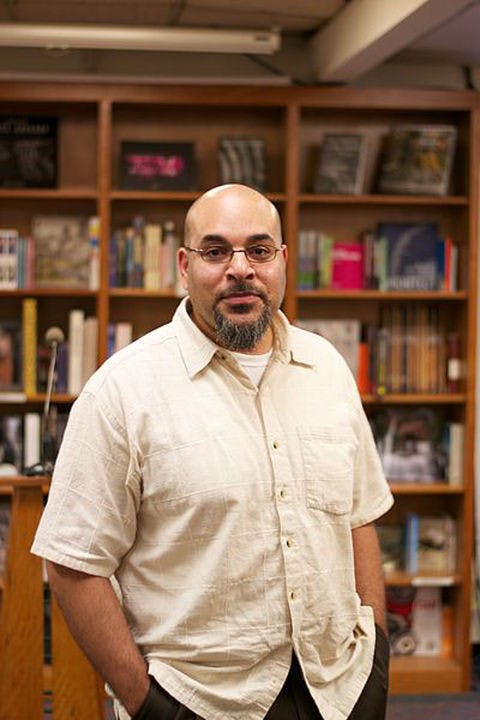BY: ALEXIS ARNOLD

Dr. Jared A. Ball, associate professor of Africana and Media Studies at Morgan State University, last week talked with American University's School of Communication about emancipatory journalism and how students can make change.

(@teachingforchange via Twitter)
First and foremost, Ball identifies as a father and a husband. Being an educator is a close second. Ball also calls himself a socialist, pan-Africanist and a radical media maker.
Outside of his work at Morgan State, Ball is active in the media industry, with credits that include founding and producing "FreeMix Radio," as well as hosting and producing The Real News Network in Baltimore. He also writes for the Black Agenda Report, the Atlanta Black Star and has published the book "I Mix What I Like: A Mixtape Manifesto."
The idea for "I Mix What I Like" came about when Ball was creating mixtapes with grassroots organizations. The title is a tribute to the "I Write What I Like" column by Steve Biko, a leader of the black consciousness movement in South Africa. Ball decided to apply Biko's philosophy to his own work through the creation of journalistic mixtapes that can be distributed as culturally different representations of their organizations.

Before he gave his presentation, Dr. Ball spoke with the Blackprint about his work and the change he believes in.
The Blackprint: What is emancipatory journalism, and where does that idea come from?
Dr. Jared Ball: ‘Emancipatory journalism' is a phrase coined by Dr. Hemant Shah, a professor of journalism in Madison, Wisconsin. I found this theory in a communication theory journal by accident when I was in grad school. Simply put, it is an argument that the so called ‘the world majority' or so called ‘people of color' need a brand of journalism and media that recognizes their colonial status, their lack of freedom and the false balance and falsely westernized notions of objectivity.
BP: What topics do you cover in your book, "I Mix What I Like: A Mixtape Manifesto"?
JB: The book is my attempt to explain the philosophy behind [emancipatory journalism]. As a colonized people, [African-Americans] can use the autonomy and the sovereignty that the mixtape provides to not only show that hip-hop can be more [broad] than the commercial world, but journalistically to promote our organization. It touches on colonialism, hip-hop, the tradition of the mixtape, radical media making, movement making and journalism.
BP: What was the one of most powerful projects you have ever worked on?
JB: I've been involved with grassroots political work for a long time, so I am proud of the support I gave to the Malcolm X Grassroots organization and helping promote the work of Arlene Eisen and her 'Every 28 Hours' report. But, in terms of media making, the most proud I've been is of both the audio and video versions of the George Jackson tribute mixtape.
BP: What advice do you have for young journalists coming up in this changing media environment?

JB: As best they can, attach themselves to radical organizations, and cover that work in order to give voice to people trying to radically improve the world. If they are forced to take commercial mainstream jobs, which many are, they should find ways to push the boundaries while there, or, even under the radar, support grassroots media efforts that will expand the range of stories and ideas beyond what the commercial outlet will allow.
BP: For those who could not attend the event, what are three things that they should know?
JB: One - shameless plug - they can always go to imixwhatilike.org and follow up with the work we are doing there, which is growing and changing. I would want them to know that media and journalism are battlegrounds. They are weaponry that are used for and against us. Popular mainstream and commercial media and journalism are insufficient for the needs of a continually oppressed group of people.
Ball ended our interview by encouraging people to organize around their work more. "We need fewer independent media makers and more organized collectives working together, producing media together and building movements together."

(Giphy)
Cover: Africa World Now Project



